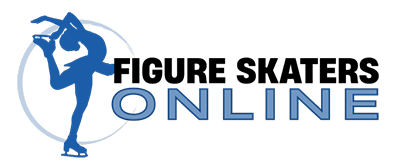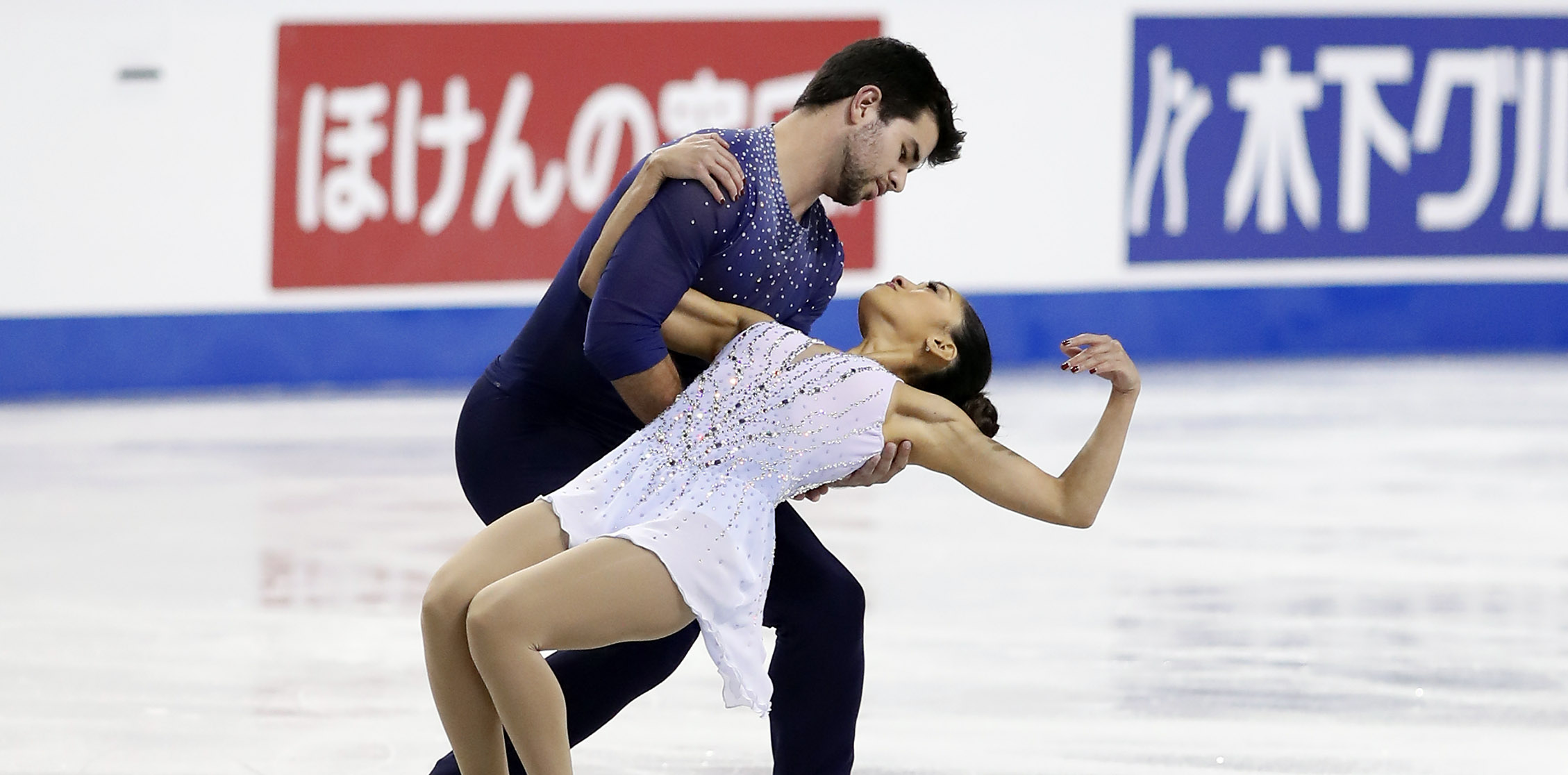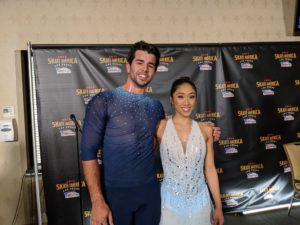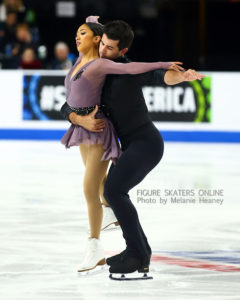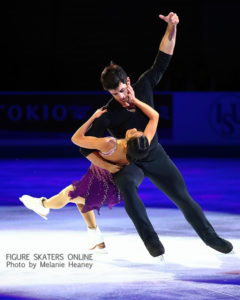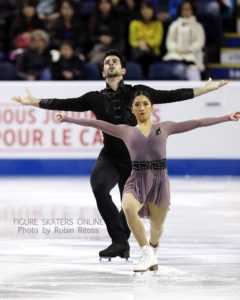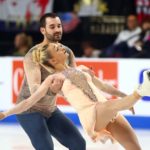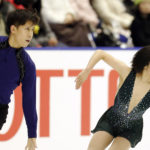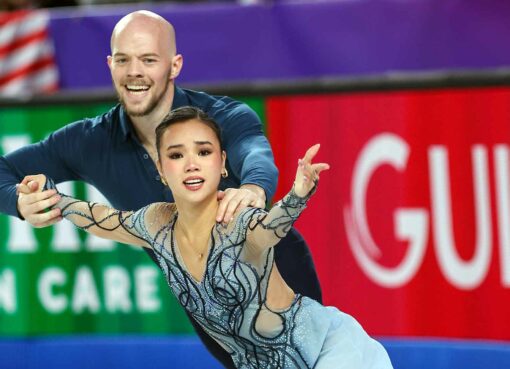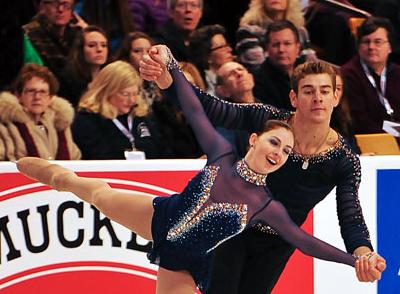By Claire Cloutier, Team FSO contributing writer
Photos by Claire Cloutier, Melanie Heaney and Robin Ritoss
It’s been a whirlwind year and a half since Jessica Calalang and Brian Johnson, both 24, teamed up in spring 2018. They started competing a few months later, and placed a promising fifth at the 2019 U.S. Championships.
This season, Calalang and Johnson’s schedule has been quite full. The pair competed at Skate Detroit in the summer, then at U.S. International Figure Skating Classic in Salt Lake City, and continued with the first 2 Grand Prix events of the season, Skate America and Skate Canada. Last weekend, they achieved their biggest success to date, winning the ISU Challenger Series event Warsaw Cup. They topped a field of 21 international pairs in Warsaw.
It’s been a busy season indeed. But as a relatively new team, Calalang and Johnson feel a sense of urgency. “We’re trying to really get the experience in and keep coming closer to all of our competitors,” Johnson said. “Because they have the years. And we’ve got to get there.” With the 2022 Olympics coming up, Calalang and Johnson are on a mission to grow their partnership as quickly as possible.
After they competed at Skate America, Calalang and Johnson took a few minutes to talk with Figure Skaters Online about how their partnership started and their progress this season.
Figure Skates Online (FSO): Before you teamed up, both of you were in long-term partnerships with other pairs skaters. Brian, you skated for four years with Chelsea Liu; Jessica, you skated for seven years with Zack Sidhu. Both partnerships ended after 2018 Nationals. How did you decide to try out together?
Jessica Calalang: We decided to have a tryout because we were training under the same coaches [Jenni Meno and Todd Sand, 1998 World silver medalists]. We already were situated living in California. So, everything would remain the same, except we would train together. All the stars were aligning, in that sense. So we had a tryout. We had messed around before; if one of our partners was injured, we’d do lifts together. So when we started trying out, it was a little familiar. But the timing of our twist and throws was different. That was something that we really had to work on a lot. And we still do, because we’ve only been together for a year and a half.
Brian Johnson: We had other tryouts. It definitely wasn’t like: “Oh, let’s break up with this person, and I’ll get with you now.” I don’t think we even thought about it, originally. It just kind of happened: “Yes, maybe we should try out. We’re here.”
Jessica: It was like: “You’re single, I’m single. Let’s try it.” (Laughs)
FSO: What were your coaches’ thoughts about the tryout?
Brian: I think they liked it. They said we looked really good together.
Jessica: Yes. It had nothing to do with [the fact that] we were both training under them. They were looking at it very objectively. They looked at skating skills, elements, technique, body line. They made sure all of that was up to par before we got together. Because we weren’t just in it for one season. We’re in it for that Olympic cycle.
Brian: They wanted it to be the absolute right pairing for both of us.
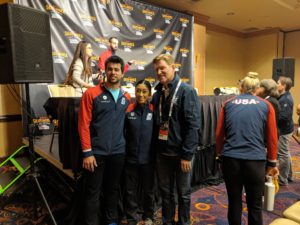
FSO: You both have worked with Todd and Jenni for some years. Can you talk about what they’re like as coaches, and your relationship with them?
Jessica: I moved to California when I was 15. So I was really young. I didn’t know what I was doing. And I’ve been with them for almost 10 years. I had done pairs for one year prior to moving over there. But they really made me into the pairs skater that I am today, and I owe a lot of it to them. They took me from the ground up to this level. I’ve always felt that nurturing connection with them. They’re like my second parents.
Brian: They definitely improved a lot of aspects of my skating, especially skating skills-wise. I love working with them both. They’re a little different in their styles. I’d say that Jenni’s almost a little more intense.
Jessica: We usually have one lesson a day with one of them, and we’ll see the other one later. It’s just nice to get the male and female perspective. Plus, they’ve been through the whole journey of going to the Olympics. [Meno and Sand competed together at the 1998 Olympics.] So they know exactly what needs to be done.
FSO: Do they usually teach separately, rather than together?
Jessica: It depends. If we’re having a problem on something, they’ll both come.
Brian: There’s four [pairs] teams at the rink right now. So we have three sessions, and they spread out with everybody. We have a couple sessions where it’s just us and Alexa and Chris [two-time U.S. champions Alexa Scimeca Knierim and Chris Knierim]. And they’ll both sometimes coach that together.
FSO: How is Robin Szolkowy mixing into the coaching situation? [Szolkowy, five-time World pairs champion with Aliona Savchenko, moved to their rink, Great Park Ice & Fivepoint Arena in Irvine, CA, in spring 2019.]
Jessica: We don’t work with him a whole lot. He works a lot with the younger pairs, because when they’re young, you have to get the technique down right from the beginning. And then, he’s also innovative with lifts.
Brian: Yes, he’s been great with that.
Jessica: He’ll say: ‘Let’s try this! I don’t know if it’s going to look good, I don’t know if it’s going to work, but try it. If it doesn’t work, it doesn’t work, we won’t do it.’ (Laughs.)
Brian: The first lift exit in our long program was [from] him. We were trying to think of something that wasn’t just a bring-down or cartwheel. And he said: ‘Try this.’ I love working with him.
FSO: Brian, you talked about improving your skating skills. How have Todd and Jenni helped with that?
Brian: Extension, lines, get the leg higher, foot turnout, more efficient on the crossovers. When I first came to them, I could get speed, but it really looked like I was working hard. I’m still trying to make it look effortless–getting down in my knees, and refining everything.
FSO: So they’ll coach you, as you go through crossovers and stroking?
Brian: Yes! Every once in a while, I’ll do a foot wrong, and Jenni will say: ‘Turn your foot out!’
FSO: So you had a similar basis in skating skills, from working with the same coaches. How did the other elements go when you first started skating together?
Jessica: Lifts were no problem. When we first started doing it, the triple twist was a little wild. Just because it was bigger than when I was doing it with Zack.
Brian: It was really just feeling the timing with everything. It takes a while, just a bunch of reps, you’ve got to feel it out. As a pairs guy, and going through a couple partners, I feel like everything has been different with everyone. So you have to find that little groove, and then you can really start maneuvering from that.
FSO: In other interviews, you mentioned throw jumps as being one of the more challenging elements.
Brian: We had a big problem with throws when we first started. She was so different from every other partner I’d had. It’s not a bad or a good thing. I had never done throws with somebody who had her timing. So it was really hard for me to adjust, especially on the Salchow–she likes to hold it a long time before the takeoff. I just wasn’t used to it and it took me a while. Todd at one point said: ‘Yeah, it took Jenni and I three months to get a throw. You guys will be fine.’
FSO: Jessica, I remember talking with you and Zack Sidhu at 2018 U.S. Championships, and you said that throws were a point of pride with you — that you felt you didn’t miss them very often.
Jessica: Yes. When I missed [a throw] in 2018, that was, like, heartbreaking for me. Yes. I had only done throw triples with Zack. I’d been with the same person for years, I had the timing, I didn’t have to worry about it. I didn’t have to think too much. Then, going with Brian, we really had to dissect the throw a little bit. And I had to not be so stubborn about doing it a certain way, because it is a totally different person. We just had to find that technique that worked. Compromise. (She smiled.)
FSO: Let’s talk about the artistic side of things. How have you developed your style as a team since you paired up?
Brian: I think we both felt comfortable with similar styles already. When we teamed up, it was pretty easy to mesh those. Our long program [this season], we both feel really comfortable doing. Our short program this year was a step out of our comfort zone, but I think it was a really good step in advancing us as a team. Benoit [Richaud] is a great choreographer. He had us do a lot of things that were new to us. And we love it. We’re going to keep trying to work on different stuff.
Note: Calalang and Johnson’s 2019-20 short program was choreographed by Benoit Richaud to “Light of Seven,” a song from the Game of Thrones soundtrack. Cindy Stuart choreographed their long program to the lyrical ballad “You Are the Reason.”
Jessica: Our long program last year and this year are similar, with slow, beautiful pieces of music. For the short last year, we did that salsa/disco thing [“Salsation” by David Shire]. So for the short program this season, we wanted to go in a different direction. This was a direction that we weren’t really thinking of, but we’re really happy [with it]. Always trust your choreographer! They know. They know more than you do. Benoit is such an amazing skater. When he skates by himself, he’s able to be all loose. And we’re so used to being stiff: ‘Okay, make sure the lines match!’ It’s easy to match when your lines are straight. But if you’re starting to add elbow- and wrist-bends, and other stuff, it’s hard.
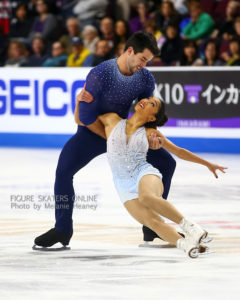 FSO: You worked with Cindy Stuart on your long program. Had either of you worked with her in the past?
FSO: You worked with Cindy Stuart on your long program. Had either of you worked with her in the past?
Jessica: Yes, I had.
Brian: I never worked with Cindy until this year. But she was great as well. All the transitions and stuff, she came up with in her head. And we could do them.
FSO: You have a nice finishing touch this season in terms of your costumes, designed by Lisa McKinnon. What was it like, working with her?
Jessica: She was great. She asked: ‘What color do you want? What do you see?’ And I just usually tell her: ‘Whatever you see. You have the creative mind–I don’t.’ Again, trust your costumer designer. They see things totally differently–in a good way.
Brian: She’s great. She’ll send us a couple sketches. And we can say: ‘Oh, we like this one, or parts of this one.’
FSO: Brian, do you have specific preferences when it comes to costumes?
Brian: I’ve worn so many different things over the years–it does not bother me one bit. There was one year that I had pink polka-dot bedazzled suspenders. (Laughs.) I’m fine with whatever.
Jessica: Once, he and Chelsea [Liu] did Beauty and the Beast. And he had this velvet thing with ruffles. That was a costume.
Brian: One thing I don’t like is when I’m halfway through a long and I’m already drenched in sweat. So, the thinner the better [in terms of fabric]. That’s my only requirement.
FSO: As a pair, you have to work together a lot every day. How do your personalities mesh, and your working styles?
Brian: Our styles are, I would say, a little different. We complement each other almost perfectly. She’s regimented, and I’m a little more chill. I’m like: ‘Okay, we’re going to do this, we’re going to do that, whatever.’ I think it meshes really well together. We kind of counteract. She can explain it better.
Jessica: Yes. We have the same goals. We have the same mindset going into practice. It’s just that he’s more on the relaxed, calm side. And I am more on the–a little intense–side. So when we come together, it puts us in the middle. He reminds me that it’s just skating; we’re going to have fun. Don’t forget to have fun. And I am more like: ‘Okay, we’ve got to get this done, this done, this done.’ Bringing that together makes each day in training very positive. We get a lot of work done. We’re putting our reps in; we’re doing our job.
Jessica: We’re trying to get the miles in. Because all our other competitors, they’ve been together for so long, and we’re–
Brian: –Trying to cram everything together as quick as possible.
Jessica: Yes. Being smart about it, but still making sure we’re improving every day.
FSO: Many pairs, such as the Knierims, have been together for a long time.
Jessica: We see them every day, and we’re like– [makes a wow! expression]. The other day, they asked us: ‘Okay, so if you wanted to watch skaters who have 10.0 skating skills, who would you watch?’ And we both said: ‘You.’ Because they skate so seamlessly.
Brian: Everything just matches so well. It’s an amazing influence.
Jessica: Sometimes we just stop and watch.
Brian: Yes, they’re great. We get along with them really well; we’re all friends. They come in, and they always have a good attitude.
Jessica: Yes. With Todd and Jenni going to the Olympics, and our training mates, Alexa and Chris, going to the Olympics, we have this really great setup. This great outlook on skating. And we just have to use it to our advantage.
FSO: Skate America was your first Grand Prix competition together. How would you describe your experience at Skate America? And what will you focus on for the rest of the season?
Brian: The Skate America experience, for me, was amazing. I hadn’t been to a [senior] Grand Prix before. We just did the autograph session, and there were so many fans! It was amazing. Everybody in the audience cheering–it’s great. I love it.
Jessica: Yes. I liked this arena, too. [2019 Skate America took place at Orleans Arena in Las Vegas.] It’s very comfortable. I like how it’s not up to the sky. There’s just one seating area, one bowl. So everyone has to be more down [in the arena].
Brian: It’s nicer, because you get more of a sense of everybody in the audience. If they’re up in the nosebleed [section], you can wave to them, but you don’t see their expressions. Whereas here, you could see [when] everyone was like: “Oh, this is amazing,” or, “Oh, I’m sorry.” It was a great experience.
FSO: What will be on your mind as you go into Skate Canada and the rest of your season? What would you like to do differently, or better?
Brian: Well … I’d like to land my jumps.
Jessica: Just the consistency on the jumps, really. Because we do have the quality lifts, twist, spins, death spirals. So the one thing that’s missing is the side-by-side jumps. And we can both do them. We drill those babies at home. It’s just a matter of doing in competition what we do in practice.
FSO: And what do you enjoy off the ice? Brian, judging from your social media, it looks like cars are your thing.
Brian: Yes. Cars, cars, and cars. I have a bad habit of scrolling through Craigslist and Facebook Marketplace, finding what’s cheap. It’s a lot of fun. I really enjoy working on them. It’s a great way to just zone out and do one thing. Well, it’s bad when I get lost in the garage until 1:00 am, and then I have to get up at 7:00 am to go skate.
FSO: Do you prefer working on cars, or driving or racing them?
Brian: All of it. I’m an enthusiast in pretty much every sense of the word. I’m a General Motors fanboy. I’m pretty happy right now; all of my cars are from GM. At one point, that was not the case. (Laughs) There’s some really great roads in California that are just so much fun to drive. A lot of my friends from outside of skating, I met through cars. There’s an event every Saturday morning called Cars & Coffee. It just has a huge variety of everything–rat rods, super cars, lifted trucks, lowered sedans, Japanese imports, whatever. It’s amazing. I love it.
FSO: You get together and look at each other’s cars and talk about them?
Brian: Pretty much, yes.
FSO: What about you, Jessica? What are you into off the ice?
Jessica: I like to shop. I work a lot. That’s about it. [Laughs.]
FSO: Do you coach?
Jessica: Yes. Before, I worked at the rink where we used to train for six years. I loved going into my shift. I got to interact with customers and parents, who didn’t know I skated. I loved–kind of being someone else. Finding this other group that just liked me for me. And then we switched rinks to Great Park, and I started working as a coach. We both did. I’m working on getting private lessons, just with the little cute 5-year-olds.
Brian: The ones that I can’t handle. [Johnson said he generally prefers to teach older skaters.]
Jessica: They’re just so cute. And I’ve really found a passion for it; I didn’t have that before. The skating school at Great Park Ice–their Learn to Skate program–is huge. There’s so many kids who want to skate. And even adults. I’ve started to help out with the administrative work [as well]. So that’s where I put all my time. I feel like I work better when I have stuff going on. If I focus just on skating, that’s hard. It’s hard for me.
FSO: It must be nice to have a little distraction now and then.
Jessica: Yes. Like today, I had a mom text me before we got on [the ice] for our six-minute warmup at Skate America. And she said: “My son only passed Snowplow 2. I thought he was going to 3.” And I was like: “I have to go compete!” But I think it helped me a little bit. Because I was thinking: “I’ve got to make sure he gets his Snowplow 3!” I have to have something else going on, besides skating.
Note: With their fall international season now finished, Calalang/Johnson will next compete at 2020 U.S. Nationals in Greensboro, NC, in January. We wish them the best of luck at Nationals!

